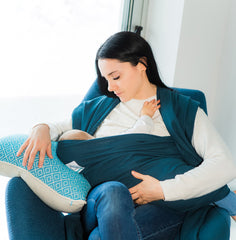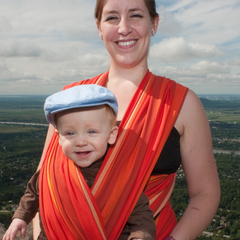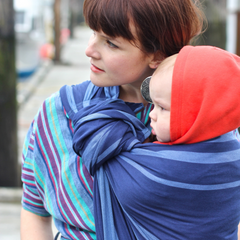Babywearing knots, ties and carries are a universe in and of themselves, there’s something for everyone and every situation! Early on, it’s normal to lack the necessary experience to know which carry to use when. We’ve prepared a few examples of situations and needs and the carries that suit them best.
A quick tip before we continue
When getting started in babywearing, the extraordinary possibilities of a baby wrap can be dizzying with how much there is to discover and learn. You don’t need to learn it all on the first day! Give yourself time to experiment and learn at your own pace: verify your knot with the help of a mirror and practice above your bed to keep baby safe or get your partner’s help when learning a new carry.
Our baby is a newborn, what should be our first carry?

- Definitely the front cross-carry! During the first few days, the baby is very fragile and will need to be carried in the front. It’s very comfortable and perfectly stable, and you’ll even be able to spend time skin-to-skin with your baby. This is a carry you’ll use for a long time and in different ways thanks to its many variants.

- When it’s time to breastfeed your baby, place him in the cradle position so as to not have to undo the wrap. Simply make sure to monitor your baby’s feeding and to bring him back to a vertical position as soon as feeding is over.
How should I carry my baby when he becomes more aware and curious?

- Is your baby turning around to see what’s in front of you? Show him! The facing out carry can be done with the baby’s legs folded inside the wrap or out starting at about 4 months. Two things to note: the position can be hard on your back because the baby’s weight is farther away from you and the sensory stimulation can be overwhelming for your baby. Take care of your back and your baby’s energy by limiting the facing out position to 20 minutes at most.
- A position that’s less tiresome for your back and much more calm for your baby would be the hip cross-carry. It’s a comfortable carry for both of you that allows your baby to look around and also lets him cuddle against you when he needs a break.
My baby is getting more cumbersome as he grows!

- As time goes by, you will carry your baby less often in front of you and more and more on your back. Did you know the cross-carry can also be done on your back? Carrying your baby on your back will give you maximum mobility to do your chores during the day and keep his hands away from the objects you’re handling!
The weather’s hot! How can I fight off the heat?

- You can keep cool despite being stuck against your baby by using a carry that minimizes the amount of fabric covering your body to avoid accumulating body heat: a towel carry will leave your shoulders uncovered by the baby wrap and only needs a short length of fabric which will let you avoid wrapping yourself up in too much fabric.

- Another way to get rid of layers without depriving yourself of babywearing is to use a slip knot to use it like a sling. If you have a pair of babywearing rings, it’s also possible to transform your baby wrap into a ring sling. It’s a small and simple modification that will make it possible to carry your baby with a strict minimum of fabric in contact with you.
We’ve linked instructional videos and resources throughout the text, but if you’re in the mood to see several carrying positions and their variants, you can take a look at one of our Facebook LIVE events where Christine Duhaime, our founder and expert, made an hour-long presentation and explanation of several carries you’ll find very useful on a daily basis. If you’d rather watch a presentation of carrying positions as they become possible with the baby’s development, we recommend you watch this instead. Good viewing!
******
Do you have more questions on babywearing? Visit our FAQ to learn more.
We regularly organize Facebook Live events on many topics around babywearing and maternity.To watch our previous events on VOD, this page. For our next events, stay in the loop by following us on Facebook. We announce our events every month.


Share:
Skin to Skin Contact With Baby: Its Benefits and How to Do It
Your Path to Fitness After a Pregnancy